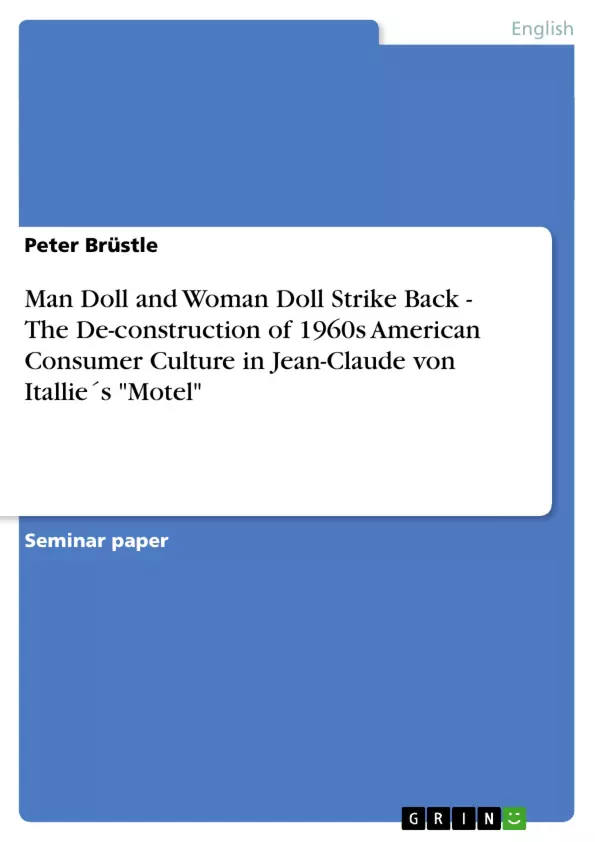It was then that began our extensive travels all over the states. To any other type of tourist accommodation I soon grew to prefer the Functional Motel - clean, neat, safe nooks, ideal places for sleep, argument, reconciliation, insatiable, illicit love. (Vladimir Nabokov, Lolita) In her very recent dissertation Kerstin Schmidt describes van Itallie’s plays as being among the “most innovative theatrical forms to have been developed in the second half of the 20th century” (87). Motel, one of his most aggressive plays, has not lost its significance more than 40 years after its first performance. As in the 1960s, its mixture of violence, political satire and theatrical innovation is still of relevance to present-day audiences. A similar combination of postmodern violence, commodity-fetishism and crisis of identity has for example been adopted by the British “inyerface-theatre” of the 1990s 1 . As far as literary criticism is concerned, there have been publications by three significant authors on Jean-Claude van Itallie’s Motel. The most profound are Gene A. Plunka’s writings in which he works out the influence of Jean Artaud’s The Theater and its Double on van Itallie’s plays and especially on Motel. Another informative contribution have been Herbert Grabes’ two essays on the possibilities of social critique and on myth and myth destruction in Motel. Only lately, Kerstin Schmidt, in her dissertation has contributed to a new critical discussion of the America Hurrah-trilogy in the context of postmodern theory. All three authors interpret the two dolls’ destructive behavior as impersonations of America’s latent aggression and as advent of a “posthumanist culture” (Schmidt, 125) the 1960s. While Plunka praises Motel for its sharp-wittedness, Grabes questions the ability of the play, to criticize existing social conditions. Especially does he condemn the play for its “Spenglerian Determinism”. Kerstin Schmidt’s approach on the other hand opens new aspects on “Motel” with her focus on the representation of the postmodern sense of identity in the play. Altogether however, the authors agree that “Man doll” and “Woman doll” symbolize the self-destructive forces within American society. Hence, they see the two dolls not so much as active agents but as passive victims of postmodern American society. From this perspective, the play must be read as a dark satire on American society, which hardly leaves any hope for social change. [...]
Inhaltsverzeichnis (Table of Contents)
- Introduction
- Motel in the Context of the America Hurrah trilogy
- The 1960s between consumer culture and counter culture
- The motel as icon of American consumer culture
- Motel and postmodernity
- Destruction as de-construction
Zielsetzung und Themenschwerpunkte (Objectives and Key Themes)
This essay aims to provide a critical analysis of Jean-Claude van Itallie's play "Motel" within the context of the America Hurrah trilogy. It aims to challenge previous interpretations of the play and explore the possibility of a more critical reading by focusing on the dolls' destructive behavior as a form of protest against consumer culture and traditional American values. The essay also examines the significance of the motel as a cultural institution and its symbolic role in postmodern American consumer culture.
- The deconstruction of 1960s American consumer culture
- The motel as an icon of postmodern American consumer culture
- The role of violence and destruction in the play
- The significance of the America Hurrah trilogy
- The influence of postmodern theory on the interpretation of "Motel"
Zusammenfassung der Kapitel (Chapter Summaries)
- Introduction: This chapter introduces the play "Motel" and its significance in the context of 1960s American culture. It also provides a brief overview of previous critical interpretations of the play, highlighting their limitations and emphasizing the need for a new perspective.
- Motel in the Context of the America Hurrah trilogy: This chapter examines "Motel" as part of the America Hurrah trilogy, exploring the interrelation between the three plays and their shared themes of social critique and cultural deconstruction.
- The 1960s between consumer culture and counter culture: This chapter discusses the social and cultural context of the 1960s, highlighting the tensions between consumer culture and counterculture, and the influence of these forces on van Itallie's work.
- The motel as icon of American consumer culture: This chapter explores the motel as a symbol of American consumer culture and its significance in the 1960s. It examines how the motel represents the values and anxieties of the period.
Schlüsselwörter (Keywords)
The main keywords and focus topics of this text are: Jean-Claude van Itallie, Motel, America Hurrah, consumer culture, postmodernism, deconstruction, violence, protest, cultural critique, 1960s, American society.
Frequently Asked Questions
What is Jean-Claude von Itallie's play "Motel" about?
"Motel" is an aggressive play that uses violence and political satire to critique 1960s American consumer culture and the crisis of identity.
What do the "Man doll" and "Woman doll" symbolize?
They symbolize self-destructive forces within American society and are often interpreted as passive victims or active agents of cultural deconstruction.
How does the play relate to the "America Hurrah" trilogy?
"Motel" is part of this trilogy, which collectively explores themes of social critique, cultural deconstruction, and the postmodern sense of identity.
What is the significance of the motel as an icon?
The motel represents the functional, neat, and safe yet illicit aspects of American consumer culture, serving as a symbolic setting for postmodern anxieties.
Which theatrical influences are evident in "Motel"?
The play is heavily influenced by Jean Artaud’s "The Theater and its Double," focusing on innovative and aggressive theatrical forms.
- Quote paper
- Peter Brüstle (Author), 2005, Man Doll and Woman Doll Strike Back - The De-construction of 1960s American Consumer Culture in Jean-Claude von Itallie´s "Motel", Munich, GRIN Verlag, https://www.hausarbeiten.de/document/70479


